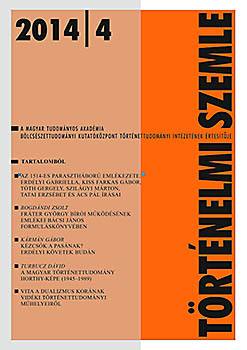Fráter György bírói működésének emlékei Bácsi János formuláskönyvében
The Records of the Judicial Activity of György Fráter in the Formulary Book of János Bácsi
Author(s): Zsolt BogdándiSubject(s): Law, Constitution, Jurisprudence, Geography, Regional studies, History of Law, Governance, Military history, 16th Century, The Ottoman Empire
Published by: Magyar Tudományos Akadémia Bölcsészettudományi Kutatóközpont Történettudományi Intézet
Keywords: Judicial Activity; György Fráter; János Bácsi; Hungary; history;
Summary/Abstract: While the political events of the decade which followed the occupation of Buda castle by the Ottomans (1541) are now fairly well known, the details of the practical administration, government and jurisdiction in the areas especially east of the Tisza river are shrouded in the greatest obscurity. For a detailed presentation of the central administration of justice in the period earmarked by the governmental activity of György Fráter the collection of all charters issued by the judicial authorities is indispensable. This, however, could not be undertaken in view of the utmost dispersal of the charter material and the narrow framework of the present study itself. Although some family archives and those of the chapter of Gyulafehérvár have been searched for judicial documents from the period of György Fráter, the majority of conclusions formulated here with regard to the process of jurisdiction are based on the notes contained in the formulary book generally known as that of János Bácsi. The chief importance of the formulary books resides in the fact that their compilators copied those texts they regarded as most typical of the judicial process, generally omitting names and dates alike, but sometimes – as in the stylionarium studied here – at least partly retaining them. The formulary book of János Bácsi was described by Anna Pécsi (1938), but she failed to notice the records made in the name of György Fráter, and also the fact that several among the texts are of non-Transylvanian provenance. The present study and the majority of conclusions formulated therein about the workings of the judicial procedure are mostly based on the notes made in the name of the Friar on the first eighteen pages of this thick volume. One of these conclusions is that the judicial forum of the personal presence of the bishop of Várad, lieutenant and then chief justice, held for the counties east of the Tisza river, gathered on well defined terms at Várad. About the personnel of this tribunal we know little: its assessors may have been those members of the chapter of Várad trained in law; among the prothonotaries only György Pósa is mentioned by the name. Alongside the counties east of the Tisza, the Friar’s judicial authority extended over the former voevodate of Transylvania, the legal system of which, however, differed from the one operating in the Hungarian counties. Here he shared judicial authority partly with the queen’s court, and partly with his two deputy lieutenants and judicial vicegerents, László Mikola and János Kemény. In t he appendix of the study, we have published only those abstracts of the notes made in the name of György Fráter which provide relevant information about the administration of justice.
Journal: Történelmi Szemle
- Issue Year: 2014
- Issue No: 04
- Page Range: 621-638
- Page Count: 18
- Language: Hungarian

